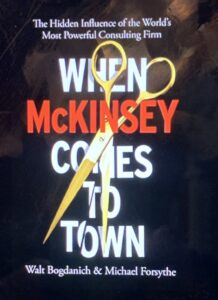Paul O’Connor takes a look at a sobering, thought-provoking book about a highly influential global management and consulting company.
Reviewed by Paul T. O’Connor
WHEN MCKINSEY COMES TO TOWN: THE HIDDEN INFLUENCE OF THE WORLD’S MOST POWERFUL CONSULTING FIRM. By Walt Bogdanich and Michael Forsythe. Doubleday. 386 pages. $29.75. Also available as an audiobook from Random House Audio read by Ari Fliakos.
 Every year, thousands of the world’s most promising university graduates endure the rigorous application process in hopes of landing a job with McKinsey & Co., a global management and consulting company.
Every year, thousands of the world’s most promising university graduates endure the rigorous application process in hopes of landing a job with McKinsey & Co., a global management and consulting company.
A job with McKinsey, even if it lasts only a short time, and many new hires are not retained long term, is a ticket to the fast track in the professional world. The company pays well and offers the opportunity to work with some of the world’s most powerful companies and governments. And, it is a company whose reputation for doing the right thing and for having principles and standards draws the most idealistic of graduates from prestigious places like Harvard Law and the University of Pennsylvania’s Wharton School of Business.
It will be interesting to see how long that reputation for high standards and ethical conduct lasts after enough people read When McKinsey Comes To Town, the expertly researched new book by Walt Bogdanich and Michael Forsythe. The authors, investigative reporters for The New York Times, nail the company as a ruthless, heartless, cold-blooded revenue producer. Forget McKinsey’s so-called high ethical standards, the authors say, because this company will work for just about anybody and offer expertise on just about anything, no matter how vile, if the price is right.
This is one of those books – David Zucchino’s Wilmington’s Lie is another – that is painful to read. There is nothing redeeming about McKinsey as it is laid out in this book. To the contrary, everything about the company and the work it does leaves the reader asking how such gifted people can be so destructive of others and the world around them?
Name a scandal or a major problem faced by the world today, and McKinsey is on the wrong side.
McKinsey was a key adviser to Purdue Pharma as it pushed OxyContin and exploded the opioid crisis. Here’s how to sell more of the drug, McKinsey advised, and how to turn even more people into addicts.
Addiction was something McKinsey knew something about from a long tenure as the tobacco industry’s leading marketing consultants. And when tobacco companies became too unpopular, only recently, to work with, McKinsey still had the vaping industry and ideas on how to increase nicotine addiction.
Been in a car accident and felt that your auto insurer tried to screw you? In the 1990s, McKinsey taught Allstate how to do just that. Then other companies followed their lead. And remember the sub-prime mortgage crisis and the collapse of the financial system? McKinsey developed the financial strategy that led to the bundling and resale of mortgages, many of which were sub-prime.
The authors report on McKinsey’s involvement in two major scandals in South Africa, in consultations with the repressive government of Saudi Arabia that led to the crushing of dissent, and with government-owned businesses in China, some of which present a clear danger to American security. Great Britain’s health care system was the most efficient and effective in the world until Conservative Party officials called in McKinsey to help cut costs. It’s no long efficient or effective, and the Brits didn’t save much money.
McKinsey’s claims to support a cleaner environment and efforts to curb global warming are so much hot air. The company may purchase carbon assets for its air travel, but it also works with coal producers to increase their sales.
McKinsey is even on the wrong side of baseball, having been a consultant to the Houston Astros in the years when they were perfecting the cheating schemes that led to their World Series championship in 2018. The team’s chief cheater is a McKinsey alum.
When McKinsey comes to town, layoffs follow. The company preaches cost-cutting through layoffs, mostly as a way to accelerate compensation growth for top management. The company doesn’t like maintenance, either, and that has led to terrible accidents at such sites as Disneyland.
Another charming characteristic: McKinsey plays for both sides. They will work for competing companies, advising Company X on how to outperform Company Y while advising Y on how to beat X. And, they will work for the tobacco companies, advising how to increase profits and sales, while working for government agencies on strategies to reduce smoking.
Maybe the saddest aspect of this book lies in the McKinsey workforce. The company draws from the best and brightest of our young people. They are recruiting the top graduates from the top academic institutions, promising these people not only generous compensation but the opportunity to do good in the world. They keep one promise but not the other.
I’m glad I read the book, but it certainly did not raise my view of the human race.